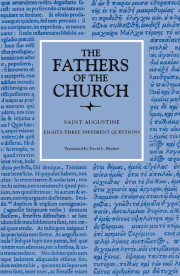

Most ebook files are in PDF format, so you can easily read them using various software such as Foxit Reader or directly on the Google Chrome browser.
Some ebook files are released by publishers in other formats such as .awz, .mobi, .epub, .fb2, etc. You may need to install specific software to read these formats on mobile/PC, such as Calibre.
Please read the tutorial at this link: https://ebookbell.com/faq
We offer FREE conversion to the popular formats you request; however, this may take some time. Therefore, right after payment, please email us, and we will try to provide the service as quickly as possible.
For some exceptional file formats or broken links (if any), please refrain from opening any disputes. Instead, email us first, and we will try to assist within a maximum of 6 hours.
EbookBell Team

4.8
54 reviewsIn the autumn of A.D. 388, St. Augustine returned from Italy to
northern Africa. Here in his native Thagaste he assembled a monastic
community. When the brethren found their leader Augustine in a rare
moment of leisure, they had no misgivings about putting questions to him
on a variety of topics which he answered from the store of his vast
knowledge. These questions together with the answers were later
collected and assembled in a random order (ractions ). The
English translation presented here affords the reader a rare opportunity
to glimpse some of the topics that interested members of a community
that eventually gave the early Church four bishops: Alypius of Thagaste,
Severus of Milevis, Profuturus of Citra, and Possidius of Calama.Even
though St. Augustine intended no specific sequence in this collection,
four broad categories in the question and answer literary form are
discernible. One category serves as Christian apologetic, e.g., against
Arian and Manichaean errors. The second presents Augustine in the role
of exegete of selected passages from both the Old and New Testaments.
The third and fourth categories, containing the greater number of
questions and answers, show Augustine the philosopher and theologian, a
person of towering intellectual stature in western Christianity and one
of the important "Founders of the Middle Ages." Though formulated
between the years A.D. 388 and 395/97 and presented from the viewpoint
of Neoplatonists, many topics, e.g., the cause of evil, sin and
freewill, still have great relevance for the modern reader.